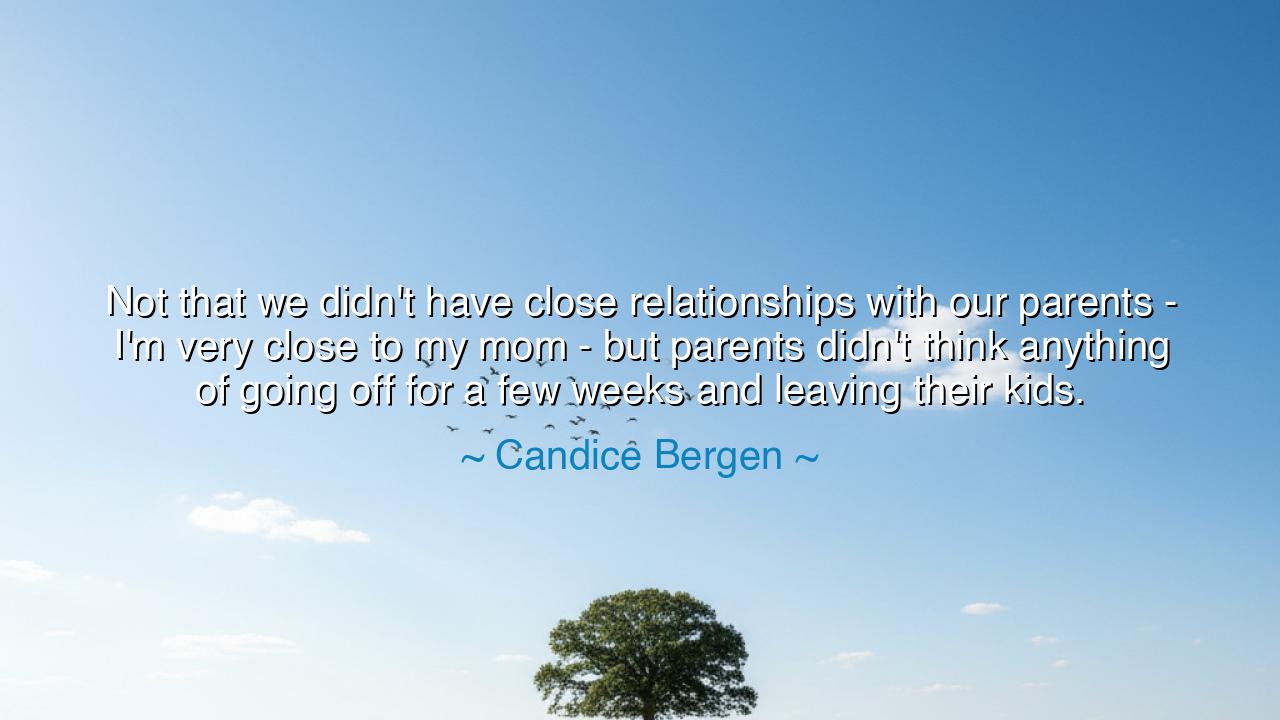
Not that we didn't have close relationships with our parents -
Not that we didn't have close relationships with our parents - I'm very close to my mom - but parents didn't think anything of going off for a few weeks and leaving their kids.






Hear, O listeners, the words of Candice Bergen, who spoke with the voice of memory, reflecting upon a different season of family life: “Not that we didn't have close relationships with our parents – I'm very close to my mom – but parents didn't think anything of going off for a few weeks and leaving their kids.” In this remembrance lies both tenderness and distance, love and absence, the paradox of parenthood in another age. It is not a condemnation, nor a denial of love, but an acknowledgment that closeness of the heart does not always mean constancy of presence.
The meaning of her words is layered. On one hand, she affirms the bond of love—her closeness to her mother endures. Yet she also reveals a cultural truth: that in times past, parents often entrusted their children to others while they traveled or pursued their own affairs, without fear of judgment or guilt. The rhythm of family life was different; independence was cultivated earlier, and parental presence was not measured in constant companionship. Bergen’s reflection is both a memory of love and an insight into generational change.
History tells us much of this pattern. In the noble courts of Europe, children were often raised not by their parents, but by tutors, governesses, and servants. Kings and queens might spend long months away from their heirs, yet still claim deep affection. Consider Queen Victoria, who adored her children, yet left them often in the care of attendants while she bore the weight of empire. Love was present, but distance was part of the order of life. To the modern ear, it may sound cold; to them, it was simply custom.
The lesson hidden in Bergen’s memory is the recognition that love takes many forms. Some generations equate love with constant presence; others with provision, duty, and trust. The child may feel both the blessing and the wound of such arrangements. For though independence is forged, the ache of absence may also linger. Bergen’s words capture this duality: she is “very close” to her mother, yet she remembers too the long stretches of separation. Love and absence are woven together in her story.
And yet, her reflection also invites compassion across time. Each age raises children according to its wisdom and its limitations. What one generation calls freedom, another may call neglect. What one age calls devotion, another may call overprotection. But the truth is that all parents, in every time, stumble between their own needs and their children’s, between presence and absence, between love expressed and love withheld. Bergen’s honesty is a reminder not to judge too harshly, but to understand.
The warning is clear: let not absence become the excuse for indifference. Parents may depart for work, for duty, or for rest, but they must return with presence of heart. For no child thrives only on provision—they need remembrance, connection, the assurance that they matter beyond the necessities of life. To leave without care is neglect; to leave and return with love is balance. Bergen’s closeness to her mother suggests that love endured despite absence, but not every story ends so well.
The practical action for us today is to reflect upon the meaning of presence. To be with a child in body, yet absent in spirit, is no true presence. To be away in body, yet constant in love and attention, may still forge closeness. Let us therefore cultivate not only time, but intention. When with loved ones, be truly with them. And when apart, ensure that love is felt in word, in memory, in promise kept. For love is not measured only by hours, but by the depth of care woven into every moment.
Thus, Candice Bergen’s words endure as both memory and teaching: parents did not think anything of leaving, yet love remained. Let us take from this the wisdom of balance: to cherish closeness, to honor independence, and to remember always that love is not the absence of absence, but the presence of devotion. In this, we learn to be both rooted and free, both near and strong, both parents and children across the ages.






AAdministratorAdministrator
Welcome, honored guests. Please leave a comment, we will respond soon